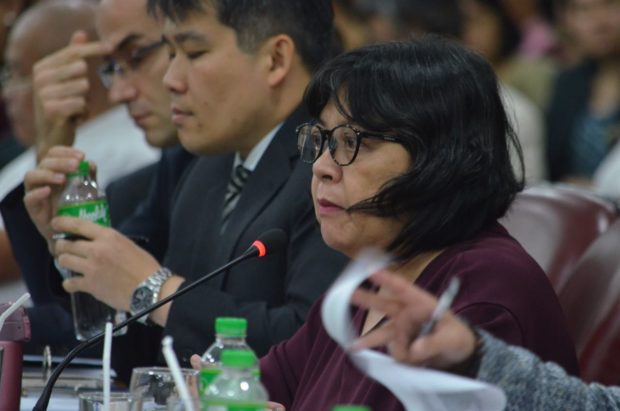
Dr. Leonila Dans. NOY MORCOSO/INQUIRER.net
Sanofi Pasteur’s claim that the Dengvaxia vaccine is safe and effective was a premature declaration because the study on its safety has not yet been completed, a health expert said Wednesday.
Dr. Leonila Dans, Rheumatology Section chief of the Philippine General Hospital (PGH) in Manila, said Sanofi Pasteur’s proclamation that Dengvaxia was safe and effective was based only on the first two years of its study, or from 2012 to 2013, contrary to the World Health Organization (WHO) guidelines.
The guidelines say studies on all new dengue vaccines should be up to five to six years, which should have ended only in November this year.
“I think the recommendation and proclamation that the vaccine is safe and effective was premature because they were still doing the study until last month,” Dans told the House committee on good government and public accountability hearing on the botched P3.5-billion dengue immunization program.
“So when they started to say that the vaccine is safe and effective, that was only based on the first two years of the study. The study was still ongoing by the time we started en masse immunization,” she added.
Dans said that by year three of the study, Sanofi Pasteur issued its interim report, and experts started to see danger signs on the effects of the vaccine.
“And for our very young, that’s 2-5 years old, it increased the risk by seven times. That means it’s a red flag, we should be concerned. And they should have been concerned about this,” she added.
Dans said the findings of the interim report should have been enough for Sanofi Pasteur to decide that it should not proceed with the mass vaccination or recommend it for a big population.
The House committee on good government and public accountability has relaunched its investigation on the school-based immunization program following reports of irregularities.
The Department of Health said more than 800,00 public schoolchildren nine years old and above in three highly endemic regions—Metro Manila, Central Luzon and Calabarzon—have received at least the first of three doses of the first licensed dengue vaccine.